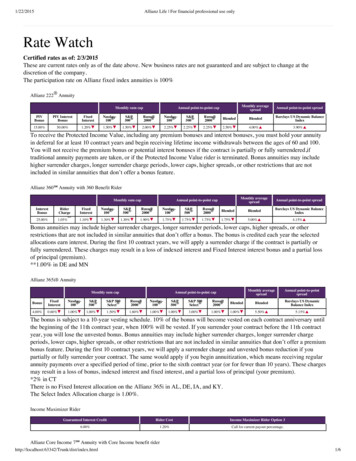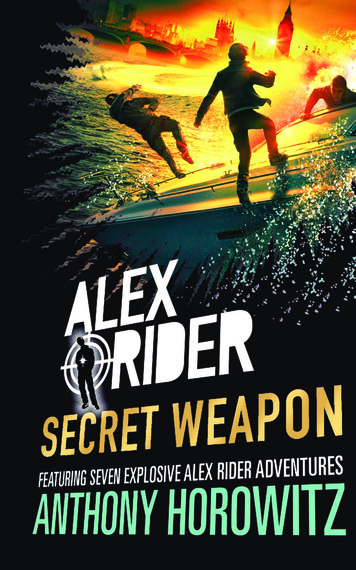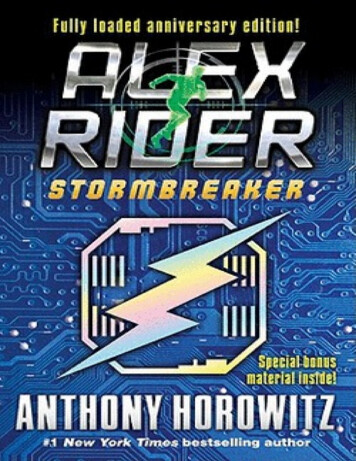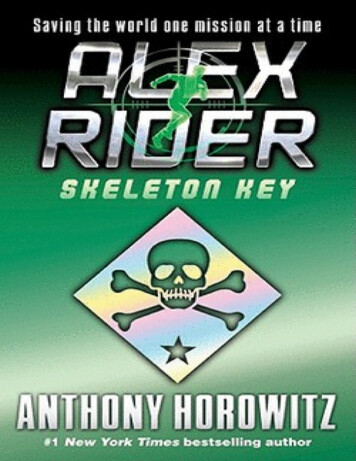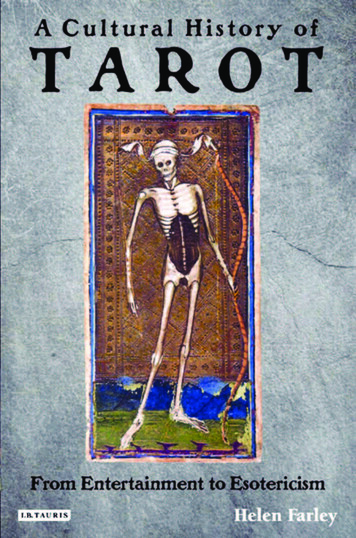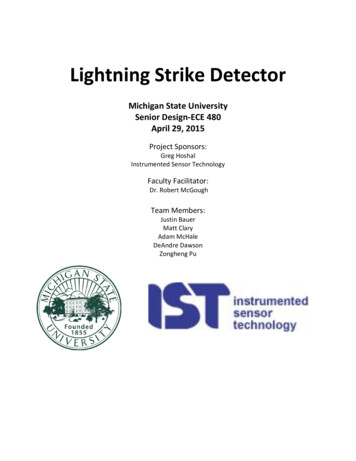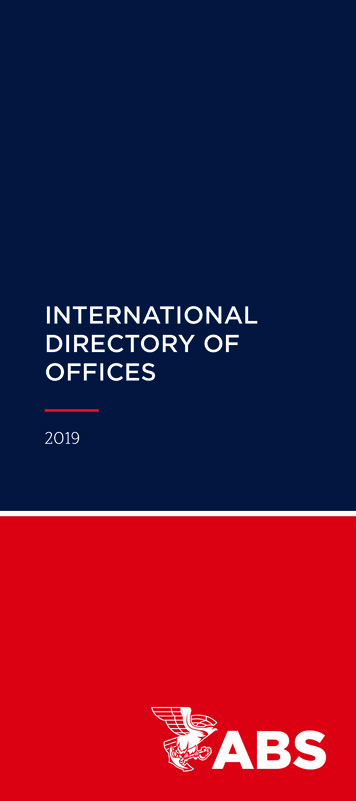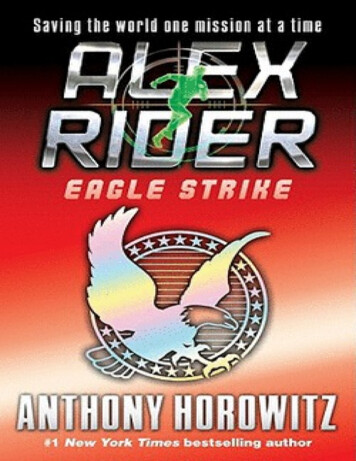
Transcription
Eagle StrikeAlex Rider [4]Anthony HorowitzPuffin (2011)Amazon.com ReviewEagle Strike, Horowitz’s fourth fictional foray into the world of British spy agency MI6, starts outcalmly enough as Alex and his lovely companion, Miss Sabina Pleasure, vacation with her family inthe south of France. But before you can say Goldfinger, Alex spots his old nemesis, renownedassassin Yassen Gregorovich, on the beach. What Alex discovers is a plan so diabolical that it makesall of his previous adventures seem like a stroll in the Queen Mum’s garden. Alex must fight to keepGregorovich from executing the plans of a mysterious and murderous madman--an operation codenamed "Eagle Strike." He will just have to face down a few minor complications first: a virtualreality game that inflicts real pain; a fleet of Porche 911 GT3-driving hit men; and even a near fatalbrush with death aboard the most famous aircraft in the world, Air Force One. But he’ll persevere, orhis name isn’t Rider: Alex Rider. Eagle Strike, like all of the ridiculously fun Alex Rider adventures,is a pure guilty pleasure from start to finish. Even the most reluctant of readers won’t be able to resistAlex’s Bond-like ingenuity and charisma. Anthony Horowitz is a master of pacing, and as Alexswings from one cliff-hanging chapter to the next, Horowitz proves that you don’t have to beShakespeare to pen a crackerjack plot! --Jennifer HubertFrom School Library JournalGrade 5-10--Alex Rider, a 14-year-old secret agent who has worked for MI6--British militaryintelligence--returns for his fourth adventure. Vacationing in France with his girlfriend, SabinaPleasure, and her parents, Alex spots Yassen Gregorovich, a known assassin, and senses somethingisn't quite right. Before long, Sabina's journalist father is injured in an "accidental" bombing and Alexis thrown into another mystery that involves a devious scheme to annihilate the world. In this heartracing novel, Horowitz combines fast-paced action with ingenious gadgets that Alex either has on hisside or is forced to battle against. The straightforward writing will appeal to a wide audience; thestory is intricate enough to entertain older readers, but accessible to younger ones as well. For anyonewho has enjoyed Alex's previous adventures, EagleStrike will prove just as good if not better, andfor those who haven't been introduced to this young spy, this book will certainly get them addictedand anxiously awaiting the next installment. --Leigh Ann Morlock, Vernonia School District, ORCopyright Reed Business Information, a division of Reed Elsevier Inc. All rights reserved.
PROLOGUEThe Amazon jungle. Fifteen years ago.It had taken them five days to make the journey, cutting their way through the dense, suffocatingundergrowth, fighting through the very air, which hung heavy, moist and stilt. Trees as tall ascathedrals surrounded them, and a strange, green light—almost holy—shimmered through the vastcanopy of leaves. The rainforest seemed to have an intelligence of its own. Its voice was the suddenscreech of a parrot, the flicker of a monkey swinging through the branches overhead. It knew theywere there.But so far they had been lucky. They had been attacked, of course, by leeches and mosquitoes andstinging ants. But the snakes and scorpions had left them alone. The rivers they had crossed had beenfree of piranhas. They had been allowed to go on.They were travelling light. They earned with them only their basic rations: map, compass, waterbottles, iodine tablets, mosquito nets and machetes. Their single heaviest item was the 88Winchester rifle with Sniperscope that they were going to use to kill the man who lived here in thisimpenetrable place, one hundred miles south of Iquitos in Peru. The two men knew each other snames but never used them. It was part of their training. The older of the two called himself Hunter.He was English, although he spoke seven languages so fluently that he could pass himself off as anative of many of the countries he found himself in. He was about thirty, handsome, with the close-cuthair and watchful eyes of a trained soldier. The other man was slim, fair-haired and twitching withnervous energy. He had chosen the name of Cossack. He was just nineteen years old. This was hisfirst kill. Both men were dressed in khaki—standard jungle camouflage. Their faces were alsopainted green, with dark brown stripes across their cheeks.They had reached their destination just as the sun had begun to rise, and were standing there now,utterly still, ignoring the insects that buzzed around their faces, tasting their sweat.In front of them was a clearing, man-made, separated from the jungle by a ten metre high fence.An elegant colonial house with wooden verandas and shutters, white curtains and slowly rotating fansstood at the heart of it, with two more low brick buildings about twenty metres behind.Accommodation for the guards. There must have been about a dozen of them patrolling the perimeterand watching from rusting metal towers. Perhaps there were more inside. But they were lazy. Theywere shuffling around, not concentrating on what they were supposed to be doing. They were in themiddle of the jungle. They thought they were safe.A four-seater helicopter stood waiting on a square of asphalt. It would take the owner of the housejust twenty steps to walk from the front door to the helicopter. That was the only time he would bevisible. That was when he would have to die.The two men knew the name of the man they had come to kill, but they didn t use that either.Cossack had spoken it once but Hunter had corrected him.
“Never call a target by his real name. It personalizes him. It opens a door into his life and, when thetime comes, it may remind you what you are doing and make you hesitate.”Just one of the many lessons Cossack had learnt from Hunter. They referred to the target only as theCommander. He was a military man—or he had been. He still liked to wear military-style clothes.With so many bodyguards he was in command of a small army. The name suited him.The Commander was not a good man. He was a drug dealer, exporting cocaine on a massive scale.He also controlled one of the most vicious gangs in Peru, torturing and killing anyone who got in hisway. But all this meant nothing to Hunter and Cossack. They were here because they had been paidtwenty thousand pounds to take him out—and if the Commander had been a doctor or a priest it wouldhave made no difference to them.Hunter glanced at his watch. It was two minutes to eight in the morning and he had been told theCommander would be leaving for Lima on the hour. He also knew that the Commander was a punctualman. He loaded a single .308 cartridge into the Winchester and adjusted the Sniperscope. One shotwas all he would need.Meanwhile Cossack had taken out his field glasses and was scanning the compound for any sign ofmovement. The younger man was not afraid, but he was tense and excited. A trickle of perspirationcurved behind his ear and ran down his neck. His mouth was dry. Something tapped gently against hisback and he wondered if Hunter had touched him, warning him to stay calm.But Hunter was some distance away, concentrating on the gun.Something moved.Cossack only knew for certain it was there when it climbed over his shoulder and onto his neck—andby then it was too late. Very slowly, he turned his head. And there it was, at the very edge of his fieldof vision. A spider, clinging to the side of his neck, just underneath the line of his chin. Heswallowed. From the weight of it he had thought it was a tarantula—but this was worse, much worse.It was very black with a small head and an obscene, swollen body, like a fruit about to burst. Heknew that if he could have turned it over, he would have found a red hourglass marking on itsabdomen.It was a black widow. Latrodectus curacaviensis. One of the deadliest spiders in the world.The spider moved, its front legs reaching out so that one was almost touching the corner of Cossack smouth. The other legs were still attached to his neck, with the main body of the spider now hangingunder his jaw. He wanted to swallow again but he didn t dare. Any movement might alarm thecreature, which anyway needed no excuse to attack. Cossack guessed that this was the female of thespecies: a thousand times worse than the male. If it decided to bite him, its hollow fangs would injecthim with a neurotoxic venom which would paralyse his entire nervous system. He would feel nothingat first. There would just be two tiny red pricks on his skin. The pain—waves of it—would come inabout an hour. His eyelids would swell. He would be unable to breathe. He would go intoconvulsions. Almost certainly he would die.Cossack considered raising a hand and trying to flick the hideous thing off. If it had been anywhereelse on his body he might have taken the chance. But it had settled on his throat, as if fascinated by thepulse it had found there. He wanted to call to Hunter, but he couldn t risk moving the muscles in his
neck. He was barely breathing. Hunter was still making the final adjustments, unaware of what wasgoing on. What could he do?In the end he whistled. It was the only sound he dared make. He was horribly aware of the creaturehanging off him. He felt the prick of another leg, this time touching his lip. Was it about to climb ontohis face?Hunter looked round and saw at once that something was wrong. Cossack was standing unnaturallystill, his head contorted, his face, underneath the paint, completely white. Hunter took a step so thatCossack now stood between him and the compound.He had lowered the rifle, the muzzle pointing towards the ground.Hunter saw the spider.At the same moment, the door of the house opened and the Commander came out: a short, plump mandressed in a dark tunic hanging open at the collar. Unshaven, he was carrying a briefcase and smokinga cigarette.Twenty steps to the helicopter—and he was already moving briskly, talking to the two bodyguardswho accompanied him. Cossack s eyes flickered over to Hunter. He knew the organization that hademployed them would not forgive failure, and this was the only chance they would get. The spidermoved again and, looking down, Cossack saw its head: a cluster of tiny, gleaming eyes—half a dozenof them—gazing up at him, uglier than anything in the world.His skin was itching. The whole side of his face wanted to peel itself away. But he knew that therewas nothing Hunter could do. He had to fire now. The Commander was only ten steps away from thehelicopter. The blades were already turning. Cossack wanted to scream at him. Do it! The sound ofthe gunshot would frighten the spider and it would bite. But that wasn t important. The mission had tosucceed.It took Hunter less than two seconds to make a decision. He could use the tip of the gun to brush awaythe black widow. He might succeed in getting rid of it before it bit Cossack. But by then theCommander would be in his helicopter, behind bulletproof glass. Or he could shoot the Commander.But once he had fired the gun, he would have to turn and run immediately, disappear into the jungle.There would be no time to help Cossack; there would be nothing he could do.He made his decision, swept up the gun, aimed and fired.The bullet, white-hot, flashed past, cutting a line in Cossack s neck. The black widow disintegratedinstantly, blown apart by the force of the shot. The bullet continued across the clearing and through thefence and—still carrying tiny fragments of the black widow with it—buried itself in the Commander s chest. The Commander had been about to climb into the helicopter.He stopped as if surprised, put a hand to his heart, and crumpled. The bodyguards twisted round,shouting, staring into the jungle, trying to see the enemy.But Hunter and Cossack had already gone. The jungle swallowed them in seconds, although it wasmore than an hour before they stopped to catch their breath.Cossack was bleeding. There was a red line that could have been drawn with a ruler across the sideof his neck, and the blood had seeped down, soaking into his shirt. But the black widow hadn t bitten
him. He held out a hand, accepting a water bottle from Hunter, and drank.“You saved my life,” he said.Hunter considered. “To take a life and save a life with one bullet that s not bad going.”Cossack would have the scar for the rest of his life. But that would not be a very long time. The life ofthe professional assassin is often short. Hunter would die first, in another country, on another mission.Later it would be his turn.Right now he said nothing. They had done their job. That was all that mattered. He gave back thewater bottle, and as the sun beat down and the jungle watched and reflected upon what had happened,the two men set off together, cutting and hacking their way through the mid-morning heat of anotherday.
NOT MY BUSINESSAlex Rider lay on his back, drying out in the midday sun.He could feel the salt water from his last swim trickling through his hair and evaporating off his chest.His shorts, still wet, clung to him. He was, at that moment, as happy as it is possible to be; one weekinto a holiday that had been perfect from the moment the plane had touched down in Montpellier andhe had stepped out into the brilliance of his first Mediterranean day. He loved the South of France—the intense colours, the smells, the pace of life that hung onto every minute and refused to let go. Hehadn t any idea what time it was, except that he was getting hungry and guessed it must soon be Lunch.There was a brief burst of music as a girl with a radio walked past, and Alex turned his head tofollow her. And that was when the sun went in, the sea froze, and the whole world seemed to catch itsbreath.He wasn t looking at the girl with the radio. He was looking past her, down to the sea wall thatdivided the beach from the jetty, where a yacht was just pulling in. The yacht was enormous, almostthe size of one of the passenger boats that carried tourists up and down the coast. But no touristswould ever set foot on this craft. It was completely uninviting, cruising silently through the water,with tinted glass in the windows and a massive bow that rose up like a solid white wall. A man stoodat the very front, staring straight ahead, his face blank. It was a face that Alex recognized instantly.Yassen Gregorovich. It had to be.Alex sat perfectly still, supporting himself on one arm, his hand half buried in the sand. As hewatched, a man in his twenties appeared from the cabin and busied himself mooring the boat. He wasshort and apelike, wearing a string vest that showed off the tattoos which completely covered hisarms and shoulders. A deckhand? Yassen made no offer to help him with his work.A third man hurried along the jetty. He was fat and bald, dressed in a cheap white suit. The top of hishead had been burnt by the sun and the skin had turned an ugly, cancerous red.Yassen saw him and climbed down, moving like spilt oil. He was wearing blue jeans and a whiteshirt open at the neck. Other men might have had to struggle to keep their balance walking down theswaying gangplank, but he didn t even hesitate. There was something inhuman about him.With his close-cropped hair, his hard blue eyes and pale, expressionless face, he was obviously noholidaymaker. But only Alex knew the truth about him. Yassen Gregorovich was a contract killer, theman who had murdered his uncle and changed his own Life. He was wanted alt over the world.So what was he doing here in a little seaside town on the edge of the marshes and lagoons that madeup the Camargue? There was nothing in Saint-Pierre apart from beaches, campsites, too manyrestaurants and an oversized church that looked more like a fortress. It had taken Alex a week to getused to the quiet charm of the place. And now this!“Alex? What are you looking at?” Sabina murmured, and Alex had to force himself to turn round, toremember that she was there.
“I m ” The words wouldn t come. He didn t know what to say.“Do you think you could rub a little more suncream into my back? I m overheating ”That was Sabina. Slim, dark-haired, and sometimes much older than her fifteen years. But then shewas the sort of girl who had probably swapped toys for boys before she hit eleven. Although she wasusing factor 25, she seemed to need more suncream rubbed in every fifteen minutes, and somehow itwas always Alex who had to do it for her. He glanced quickly at her back, which was in factperfectly bronzed. She was wearing a bikini made out of so little material that it hadn t bothered witha pattern. Her eyes were covered by a pair of fake Dior sunglasses (which she had bought for a tenthof the price of the real thing) and she had her head buried in The Lord of the Rings, at the same timewaving the suncream.Alex looked back at the yacht. Yassen was shaking hands with the bald man. The deckhand wasstanding near by, waiting. Even at this distance Alex could see that Yassen was very much in charge;that when he spoke, the two men listened. Alex had once seen Yassen shoot a man dead just fordropping a package. There was still an extraordinary coldness about him that seemed to neutralizeeven the Mediterranean sun. The strange thing was that there were very few people in the world whowould have been able to recognize the Russian. Alex was one of them. Could Yassen s being herehave something to do with him?“Alex ?” Sabina said.The three men moved away from the boat, heading into the town. Suddenly Alex was on his feet.“I ll be right back,” he said.“Where are you going?”“I need a drink.”“I ve got water.”“No, I want a Coke.”Even as he swept up his T-shirt and pulled it over his head, Alex knew that this was not a good idea.Yassen Gregorovich might have come to the Camargue because he wanted a holiday. He might havecome to murder the local mayor. Either way, it had nothing to do with Alex and it would be crazy toget involved with Yassen again. Alex remembered the promise he had made the last time they hadmet, on a rooftop in central London.You killed Ian Rider. One day I ll kill you.At the time he had meant it—but that had been then. Right now he didn t want anything to do withYassen or the world he represented.And yet Yassen was here. He had to know why.The three men were walking along the main road, following the line of the sea. Alex doubled backacross the sand, passing the white concrete bullring that had struck him as bizarre when he d firstcome here—until he had remembered that he was only about a hundred miles from Spain. There was
to be a bullfight tonight. People were already queuing at the tiny windows to buy tickets, but he andSabina had decided they would keep well clear. “I hope the bull wins,”had been Sabina s only comment.Yassen and the two men turned left, disappearing into the town centre. Alex quickened his pace,knowing how easy it would be to lose them in the tangle of lanes and alleyways that surrounded thechurch. He didn t have to be too careful about being seen. Yassen thought he was safe. It was unlikelythat, in a crowded holiday resort, he would notice anyone following him. But with Yassen you neverknew. Alex felt his heart thumping with every step he took. His mouth was dry, and for once it wasn tthe sun that was to blame.Yassen had gone. Alex looked left and right. There were people crowding in on him from all sides,pouring out of the shops and into the open-air restaurants that were already serving lunch.The smell of paella filled the air. He cursed himself for hanging back, for not daring to get any closer.The three men could have disappeared inside any of the buildings. Could it be, even, that he hadimagined seeing them in the first place? It was a pleasant thought, but it was dashed a moment laterwhen he caught sight of them sitting on a terrace in front of one of the smarter restaurants in thesquare, the bald man already calling for menus.Alex walked in front of a shop selling postcards, using the racks as a screen between himself and therestaurant. Next came a café serving snacks and drinks beneath wide, multicoloured umbrellas. Heedged into it. Yassen and the other two men were now less than ten metres away and Alex could makeout more details. The deckhand was pushing bread into his mouth as if he hadn t eaten for a week. Thebald man was talking quietly, urgently, waving his fist in the air to emphasize a point. Yassen waslistening patiently. With the noise of the crowd all around, Alex couldn t make out a word any of themwere saying. He peered round one of the umbrellas and a waiter almost collided with him, lettingloose a torrent of angry French. Yassen glanced in his direction and Alex ducked away, afraid that hehad drawn attention to himself.A line of plants in wooden tubs divided the café from the restaurant terrace where the men wereeating. Alex slipped between two of the tubs and moved quickly into the shadows of the restaurantinterior. He felt safer here, less exposed. The kitchens were right behind him. To one side was a barand in front of it about a dozen tables, all of them empty. Waiters were coming in and out with platesof food, but all the customers had chosen to eat outside.Alex looked out through the door. And caught his breath. Yassen had got up and was walkingpurposefully towards him. Had he been spotted? But then he saw that Yassen was holding something:a mobile phone. He must have received a call and was coming into the restaurant to take it privately.Another few steps and he would reach the door. Alex looked around him and saw an alcove screenedby a bead curtain. He pushed through it and found himself in a storage area just big enough to concealhim. Mops, buckets, cardboard boxes and empty wine bottles crowded around him. The beadsshivered and became still.Yassen was suddenly there.“I arrived twenty minutes ago,” he was saying. He was speaking English with only a very slight trace
of a Russian accent. “Franco was waiting for me. The address is confirmed and everything has beenarranged.”There was a pause. Alex tried not to breathe. He was centimetres away from Yassen, separated onlyby the fragile barrier of brightly coloured beads. But for the fact that it was so dark inside after theglare of the sun, Yassen would surely have seen him.“We ll do it this afternoon. You have nothing to worry about. It is better for us not to communicate. Iwill report to you on my return to England.”Yassen Gregorovich clicked off the phone and suddenly became quite still. Alex actually saw themoment, the sudden alertness as some animal instinct told Yassen that he had been overheard.The phone was still cradled inside the man s hand, but it could have been a knife that he was about tothrow. His head was still but his eyes glanced from side to side, searching for the enemy. Alex stayedwhere he was behind the beads, not daring to move. What should he do?He was tempted to make a break for it, to run out into the open air. No. He would be dead before hehad taken two steps. Yassen would kill him before he even knew who he was or why he had beenthere. Very slowly, Alex looked around for a weapon, for anything to defend himself with.And then the kitchen door swung open and a waiter came out, swerving round Yassen and calling tosomeone at the same time. The stillness of the moment was shattered. Yassen slipped the phone intohis trouser pocket and went out to rejoin the other men.Alex let out a huge sigh of relief.What had he learnt?Yassen Gregorovich had come here to kill someone. He was sure of that much. The address isconfirmed and everything has been arranged. But at least Alex hadn t heard his own name mentioned.So he was right. The target was probably some Frenchman, living here in Saint-Pierre. It wouldhappen sometime this afternoon. A gunshot or perhaps a knife flashing in the sun. A fleeting momentof violence and someone somewhere would sit back, knowing they had one enemy less.What could he do?Alex pushed through the bead curtain and made his way out of the back of the restaurant. He wasrelieved to find himself in the street, away from the square. Only now did he try to collect histhoughts. He could go to the police, of course. He could tell them that he was a spy who had worked,three times now, for MI6—British military intelligence. He could say that he had recognized Yassen,knew him for what he was, and that a killing would almost certainly take place that afternoon unlesshe was stopped. But what good would it do? The French police might understand him, but they wouldnever believe him. He was a fourteen-year-old English schoolboy with sand in his hair and a suntan.They would take one look at him and laugh.He could go to Sabina and her parents. But Alex didn t want to do that either. He was only herebecause they had invited him, and why should he bring murder into their holiday? Not that they wouldbelieve him any more than the police. Once, when he had been staying with her in Cornwall, Alex hadtried to tell Sabina the truth. She had thought he was joking.
Alex looked around at the tourist shops, the ice-cream parlours, the crowds strolling happily alongthe street. It was a typical picture-postcard view. The real world. So what the hell was he doinggetting mixed up again with spies and assassins?He was on holiday. This was none of his business.Let Yassen do whatever he wanted. Alex wouldn t be able to stop him even if he tried. Better toforget that he had ever seen him.Alex took a deep breath and walked back down the road towards the beach to find Sabina and herparents. As he went he tried to work out what he would tell them: why he had left so suddenly andwhy he was no longer smiling now that he was back.That afternoon, Alex and Sabina hitched a lift with a local farmer to Aigues-Mortes, a fortified townon the edge of the salt marshes. Sabina wanted to escape from her parents and hang out in a Frenchcafé, where they could watch the locals and tourists rub shoulders in the street. She had devised asystem for marking French teenagers for good looks—with points lost for weedy legs, crooked teethor bad dress sense. Nobody had yet scored more than seven out of twenty and Alex would normallyhave been happy sitting with her, listening to her as she laughed out loud.But not this afternoon.Everything was out of focus. The great walls and towers that surrounded him were miles away, andthe sightseers seemed to be moving too slowly, like a film that had run down. Alex wanted to enjoybeing here. He wanted to feel part of the holiday again. But seeing Yassen had spoilt it all.Alex had met Sabina only a month before, when the two of them had been helping at the Wimbledontennis tournament, but they had struck up an immediate friendship. Sabina was an only child. Hermother, Liz, worked as a fashion designer; her father, Edward, was a journalist.Alex hadn t seen very much of him. He had started the holiday late, coming down on the train fromParis, and had been working on some story ever since.The family had rented a house just outside Saint-Pierre, right on the edge of a river, the Petit Rhone. Itwas a simple place, typical of the area: bright white with blue shutters and a roof of sun-bakedterracotta tiles. There were three bedrooms and, on the ground floor, an airy, old-fashioned kitchenthat opened onto an overgrown garden with a swimming pool and a tennis court with weeds pushingthrough the asphalt. Alex had loved it from the start. His bedroom overlooked the river, and everyevening he and Sabina had spent hours sprawled over an old wicker sofa, talking quietly andwatching the water ripple past.The first week of the holiday had disappeared in a flash. They had swum in the pool and in the sea,which was less than a mile away. They had gone walking, climbing, canoeing and, once (it wasn tAlex s favourite sport), horse-riding. Alex really liked Sabina s parents. They were the sort of adultswho hadn t forgotten that they had once been teenagers themselves, and more or less left him andSabina to do whatever they wanted on their own. And for the last seven days everything had beenfine.
Until Yassen.The address is confirmed and everything has been arranged. We ll do it this afternoon What was the Russian planning to do in Saint-Pierre? What bad luck was it that had brought him here,casting his shadow once again over Alex s life? Despite the heat of the afternoon sun, Alex shivered.“Alex?”He realized that Sabina had been talking to him, and looked round. She was gazing across the tablewith a look of concern. “What are you thinking about?” she asked. “You were miles away.”“Nothing.”“You haven t been yourself all afternoon. Did something happen this morning? Where did youdisappear to on the beach?”“I told you. I just needed a drink.” He hated having to lie to her but he couldn t tell her the truth.“I was just saying we ought to get going. I promised we d be home by five. Oh my God! Look at thatone!” She pointed at another teenager walking past. “Four out of twenty. Aren t there any goodlooking boys in France?” She glanced at Alex. “Apart from you, I mean.”“So how many do I get out of twenty?” Alex asked.Sabina considered. “Twelve and a half,” she said at last. “But don t worry, Alex. Another ten yearsand you ll be perfect.”Sometimes horror announces itself in the smallest of ways.On this day it was a single police car, racing along the wide, empty road that twisted down to SaintPierre. Alex and Sabina were sitting in the back of the same truck that had brought them.They were looking at a herd of cows grazing in one of the fields when the police car—blue and whitewith a light flashing on the roof—overtook them and tore off into the distance. Alex still had Yassenon his mind and the sight of it tightened the knot in the pit of his stomach. But it was only a police car.It didn t have to mean anything.But then there was a helicopter, taking off from somewhere not
twenty thousand pounds to take him out—and if the Commander had been a doctor or a priest it would have made no difference to them. Hunter glanced at his watch. It was two minutes to eight in the morning and he had been told the Commander would be leaving for Lima on the
